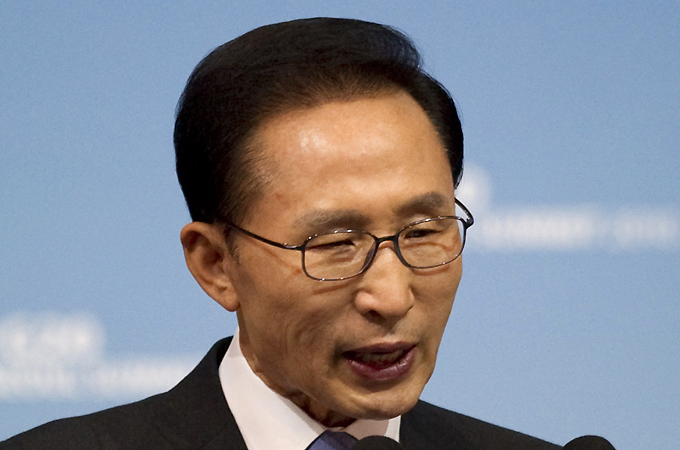S Korea: Engaging with North failed
Review says 1998 to 2008 “Sunshine policy” to reach out to North failed to curb its nucler drive or improve lives there.

 |
|
Lee Myung-bak cut off aid to the North in 2008, saying it must first give up its nuclear programmes [AFP] |
South Korea says the policy of engagement with North Korea that was pursued by its former presidents failed to curb Pyongyang’s nuclear ambitions or improve the lives of North Koreans.
Aid shipped to the North during the administrations of Kim Dae-jung and Roh Moo-hyun from 1998 to 2008 also failed to make a difference to the lives of destitute North Koreans, the unification ministry said in its annual White Paper published on Wednesday.
“Relations made progress for some 10 years amid increased cross-border activities and economic co-operation projects, but the substance of them did not live up to public expectations,” it said.
“The North’s economic crisis has not been solved and the livelihood of ordinary North Koreans did not improve at all.”
The paper called for “reciprocal” co-operation instead of unilateral aid “to forge mutual development of inter-Korean relations”.
Former leader Kim Dae-jung won the Nobel peace prize in 2000 for his “Sunshine Policy” of engaging the North and initiating dialogue between the rival Koreas, which remain technically at war after signing only a truce to end their 1950 to 1953 conflict.
During this period, two summits were held in 2000 and 2007, leading to a series of reconciliation and economic co-operation projects such as a cross-border tour programme.
Policy change
However, upon winning office in 2008, Lee Myung-bak, the current president, cut off aid and refused to give in to Pyongyang’s demand for concessions, saying the North must first give up its nuclear programmes in return for economic aid and help to build its economy.
The policy review by Lee’s government pointed to North Korea’s pursuit of nuclear arms and the sinking of a South Korean navy ship in March that killed 46 sailors as key examples of Pyongyang’s deceptive nature.
Following the policy review, North Korea pushed for talks on Thursday on resuming a joint tourism project with the South, expressing regret over Seoul’s rebuff of its earlier dialogue offer.
The North’s state media said that Pyongyang wants to discuss the tours next week, when Red Cross officials from the two sides hold talks on a programme to reunite families separated by the Korean War.
However, South Korea said on Wednesday that before any discussions could take place, Pyongyang must first return South Korean-owned buildings that were confiscated at North Korea’s scenic Diamond Mountain resort.
The North said it was open to resolving the standoff over the buildings but state media still expressed “great regret” over Seoul’s demand for the buildings’ return.
It also criticised the South for what it called “groundlessly” objecting to the North’s seizures.
The North’s economy is suffering, and the country has relied on outside food aid to feed many of its 24 million people since the mid-1990s.
A chronic food shortage in the North may have worsened following flooding this summer.